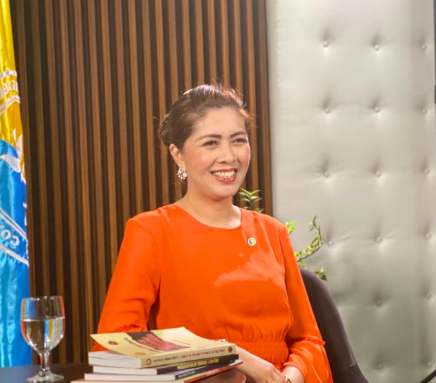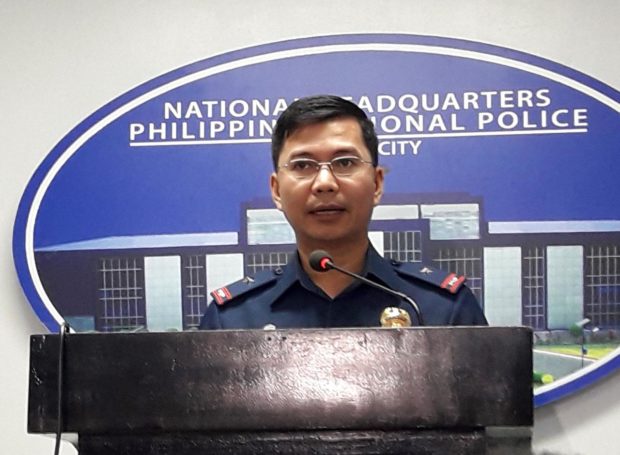‘Human rights violations’ amid quarantine enforcement add to COVID-19 blues
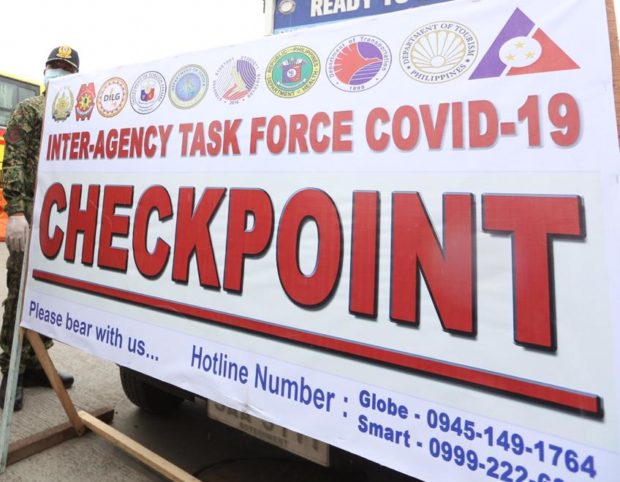
Philippine National Police Deputy Chief for Operations PLtGen. Guillermo Lorenzo T. Eleazar inspects Metro Manila Community Quarantine Checkpoints at the boundary of Meycauayan, Bulucan and Malanday, Valenzuela City, March 16, 2020.
Niño Jesus Orbeta/INQUIRER
MANILA, Philippines – One afternoon in April, Felix (not his real name), a Metro Manila resident, stepped out of his residence to buy bread for his ailing father.
He was initially allowed through a quarantine checkpoint, but a barangay tanod later trailed him and invited him twice to the barangay hall.
Felix refused, as the barangay tanod supposedly did not inform him of his supposed violation.
Felix failed to buy bread from the bakery which had already closed for the day. On his way home, around seven men were waiting for him at the checkpoint and allegedly forced him to the barangay hall of another village.
“Mayroong isang mama na pilit akong tinutulak nang pagkalakas-lakas, pagkatapos mayroon talagang chinoke hold ako sa likod ko para madala nila ako,” he said in an interview with INQUIRER.net.
Article continues after this advertisement(There is a man who pushed me hard while another one held me from the back so they could take me.)
Article continues after this advertisementAs he was being dragged, Felix’s slippers eventually snapped.
At the barangay hall, the same tanod who pushed him allegedly punched him on the side of the head.
“Talagang gusto akong saktan nung lalaki, pinoprotektahan siya ng mga ka-tanod niya. Noong tinanong ko kung ano ‘yung dahilan kung bakit ako dinetain, hindi nila ako masagot nang maayos,” said Felix.
(The man really wanted to harm me. He was being protected by other barangay tanods. When I was asking them why they detained me, they could not answer me properly.)
Felix recounted that barangay officials later explained that he was brought to the barangay office since he forced his way through the checkpoint which was covered by their barangay, even if he was initially allowed to pass through.
He said the barangay officials even threatened that he would be jailed and that they would call the police if he would not calm down.
The barangay captain offered him cash to buy food, which Felix had refused, thinking that it may be a ploy to silence him and have the case settled.
It was at this point when Felix allegedly received expletives from the barangay officials.
“Doon ako minura pagkatapos sabi niya (barangay captain), gago daw ako. Kung irereklamo ko daw sila, irereklamo din daw nila ako (That was when he cursed at me. He said that if I will file a complaint, they will do it against me too),” he said.
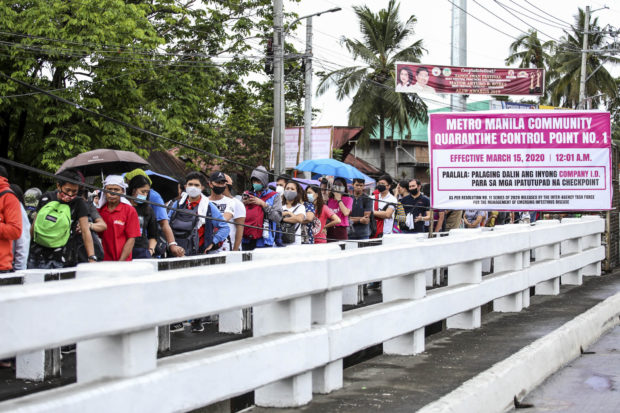
File photo shows workers from Bulacan being screened by soldiers at the province’s boundary with Caloocan City in Metro Manila in a bid to curb the spread of the novel coronavirus. (JAM STA. ROSA)
He was not able to file a complaint against the barangay officials but his mother had already relayed the incident to rights group Karapatan.
INQUIRER.net will not identify the concerned barangay for the safety of Felix.
‘Marked rights violation increase’ during pandemic
The story of Felix is not the only alleged human rights violation committed by authorities enforcing the quarantine measures.
According to Commission on Human Rights spokesperson Jacqueline De Guia, the CHR has monitored reports on quarantine violators allegedly being locked in a dog cage, forced to sit under the sun, paraded in the streets, and ordered to have their heads shaved, with some members of the LGBTQIA+ community even forced to kiss as punishment for their supposed violations.
De Guia noted that the commission has monitored a “marked increase” in allegations of human rights breach during the COVID-19 pandemic, including those allegedly involving government personnel enforcing community quarantine protocols.
According to De Guia, the CHR central office has already received 962 complaints for human rights violations and requests for assistance in just four months since March 17—when Luzon was placed under enhanced community quarantine—until July 17.
Quarantine levels in the country’s most populous region, as well as in the entire Philippines, have been later downgraded.
The top three complaints and requests for CHR assistance are alleged torture or cruel, inhumane or degrading treatment or punishment with 160 reports; followed by those related to provision of government assistance with 142 reports, and; 132 reports linked to arrests and detention.
The rest of the reports are about suppression to freedom of expression, harassment in social media, discrimination against frontliners, red-tagging of human rights defenders, and abuse of authority.
According to De Guia, some of the complainants claimed they were “wrongfully arrested.”
“Others would say that there were gaps or there were faults attributed to the law enforcers who arrested them or detained them,” the CHR official told INQUIRER.net.
“Others would say that there was no ground. For example, they had the requisites in going out and yet they were still arrested o kaya ‘yung kasama lang or nakatayo lang, nadampot pa rin (even if they were just a companion or were just standing, they were still arrested),” she added.
Meanwhile, some claimed they had sustained physical injuries that were “deliberately inflicted” on them during the arrests.
Citing the law
Amid these reports, De Guia warned that Section 4 (Acts of Torture) of the Republic Act No. 9745 or the Anti-Torture Act of 2009 is “very exhaustive” on examples of physical and mental torture.
De Guia also clarified that these figures are only based on reports received by the central office of the CHR and excludes those directly relayed to its regional offices, which means that the nationwide tally could actually be higher.
She said that the commission’s hotlines and social media pages have also become busier as most people course reports through these channels as they are confined in their homes.
‘A health issue’
“During the first days of the pandemic, we thought it was a health issue and we did not foresee that the government would look at it with, or employ a police or military approach to this pandemic,” De Guia said.
“Once they did that, there surfaced a lot of alleged complaints for arrests, detention, and torture, cruel, degrading treatment or punishment. That was something unexpected,” she added.
The CHR, De Guia shared, has managed to attend to the most urgent or grave reports and requests for assistance but some, especially those that constitute investigation, are still pending.
She pointed out that quarantine restrictions and the need for safety of CHR personnel doing ground work also pose challenges to the commission’s response to the reports it has been receiving.
‘File complaints or allegations will be baseless’
In a text message to INQUIRER.net, Interior Undersecretary Jonathan Malaya has urged Felix to report his complaint against the barangay officials allegedly involved in the incident before the Department of the Interior and Local Government (DILG).
“If, after investigation, we find merit in his complaint, we will file the necessary charges against him (concerned local official),” said Malaya.
He also urged those who have experienced similar treatment from local officials to relay the matter before concerned authorities.
“There are 44,000 barangays in the country. We continuously remind them of the Code of Conduct of Public Officials and Employees. The only way to prevent barangay officials from doing such acts is for citizens to complain so that they will be disciplined for their actions,” Malaya said.
PNP’s stand
Philippine National Police (PNP) spokesperson Brig. Gen. Bernard Banac also urged victims of alleged human rights violations committed by police officers to file formal complaints.
While the PNP can do a cursory investigation, he said the police still need complainants so that cases against erring officers can prosper.
“Otherwise, we have no actual basis. Magiging allegation lang (It will just remain an allegation) and they come out in social media,” Banac added, as he also assured that accused policemen are given a chance to explain their side.
Complainants can go to the PNP Integrity Monitoring and Enforcement Group to report crimes committed by police officers; to the Internal Affairs Service for incidents concerning improper conduct and behavior; and to the People’s Law Enforcement Board and local police stations.
Banac assured that as a policy, the PNP strictly follows all rules and regulations as well as operational procedures, especially those concerning human rights.
The PNP has a Human Rights Affairs Office (HRAO), but the unit does not have investigative powers as it is only mandated to train police officers on human rights policies, since there are already other PNP units acting on complaints against errant officers.
Banac also said that the PNP incorporates lessons on human rights in the basic training of police recruits and even in career courses for their promotion to higher ranks.
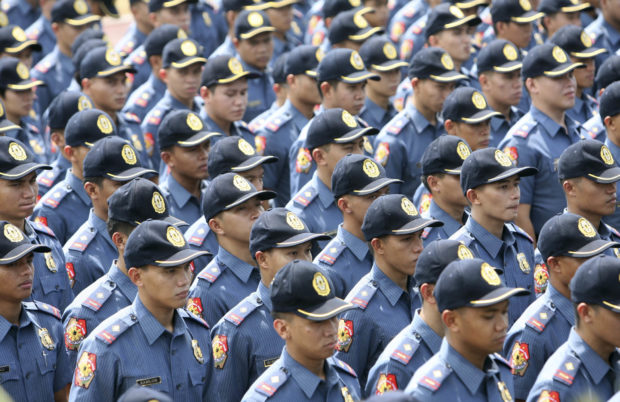
Male and female police officers assembled at Camp Crame in Quezon City. INQUIRER FILE/ MARIANNE BERMUDEZ
“We always give premium and emphasis to the protection and respect for human rights because it is in our police operational procedures,” the spokesman said.
Police officers found guilty of violations are slapped with appropriate sanctions, ranging from forfeiture of salary to suspension from duty, demotion, dismissal from service and other penalties, according to Banac.
Can CHR rely on cops’ cooperation?
De Guia said the CHR is coordinating with the PNP and concerned agencies regarding individual reports, but is the police force cooperating in the investigations?
“Generally, I would have to say that they are still on the same track of [being] not as cooperative as they were in previous years,” said De Guia.
Asked if she was referring to the time before President Rodrigo Duterte assumed office, she replied: “Yes, dati kasi ang dali-dali lang (it was so easy before).”
While she noted that every administration had its share of alleged human rights violations, there is a difference on the alleged disregard on human rights under the Duterte government compared to those in previous presidencies.
“This administration, in terms of the rate and scale of alleged human rights violations pertaining to civil and political rights, would show that there is really a difference,” said De Guia, describing the situation on such rights as a “cause of concern.”
Malacañang has earlier assured that the DILG, which has supervision over local government units and the PNP, is “committed to upholding human rights at all times and will not tolerate any violation” during the community quarantine.
Subpoenas and letters of request for comment were already sent to accused police officers, according to De Guia.
Some local government units have likewise replied to CHR and said complaints have been filed against the officials who committed the alleged inhumane punishment and that they have already ceased from doing those practices.
Meanwhile, De Guia also lamented the supposed refusal of some PNP units to provide reports or information to the CHR, not just in the drug war but also in other cases.
“Unfortunately in some instances, we have seen it in cases not even pertaining to drugs. So we are hopeful that they will not continue with this practice and most especially, let it not affect other cases,” she said.
PNP on human rights
Brig. Gen. Ildebrandi Usana, director of the PNP Human Rights Affairs Office, said the unit has long been working with the CHR in terms of training and policy measures on human rights within the police agency.
“If at all, CHR has been sending advisories to the PNP this year on some HR (human rights) concerns during the pandemic which we are putting into place as well,” he said.
However, quarantine protocols have also affected the partnership efforts between both bodies, according to Usana.
Call for humanitarian approach to pandemic
While De Guia said the CHR acknowledges the difficulty of the situation in the country due to COVID-19, she urged the government to employ a humanitarian approach in addressing the pandemic.
“This is something that the government has always emphasized, that they want to guarantee the protection of all the people and their right to health. They might as well make sure that all measures are consistent with that objective,” she added.
“Therefore, a strong-handed, military approach is something that they have to revisit, and we hope that they will be encouraged to implement a human rights-based approach instead where all stakeholders will be happy,” she concluded.
RELATED STORY
Palace wants details on alleged human rights violations linked to ECQ
